If you have decided to try the Whole30 program, you may wonder what types of milk you can have on the diet.
The diet’s restrictions prevent you from consuming dairy.
This means you can’t have regular cow’s milk while on Whole30, so you may turn to a plant-based alternative like almond milk instead.
You can have almond milk on Whole30, but you must consider several factors when choosing a beverage that meets the strict guidelines of Whole30.
Learn more about drinking almond milk on Whole30, including what ingredients to avoid and which brands are Whole30-approved so you can stick to the diet for the full 30 days.
What is Whole30?
Whole30 is a dietary approach created by Melissa Hartwig in 2009.
The Whole30 book was released in 2015 and has been a popular approach to transitioning into clean eating ever since.
According to the Whole30 website, those trying the approach have to follow the program rules for a full 30 days to reap its benefits, including losing weight and changing their relationship with food.
A brief run-down of Whole30’s dietary restrictions are as follow:
What you can eat on Whole30:
- Meat
- Eggs
- Seafood
- Fruit
- Vegetables
- Herbs/spices
- Natural fats
What to avoid on Whole30:
- Added sugar (includes table sugar, natural sugar like maple syrup, and artificial sweeteners)
- Alcohol (including cooking wine)
- Grains (including fours and starches made with grains)
- Legumes (beans, peanuts, soy)
- Dairy products
- Sulfites
- Carrageenan
- Baked goods or recreated baked goods
Exceptions that are allowed on Whole30:
- Clarified butter/ghee
- 100% fruit juices
- Green beans and peas
- Vinegar
- Alcohol-based extracts such as vanilla
- Iodized salt
Here's a helpful video from Well + Good that explains more about the Whole30 diet:
Is Almond Milk Allowed on Whole30?
Yes, some almond milk is allowed on Whole30.
In its most basic form, almond milk is made of water and raw almonds.
Since almonds and water are approved for Whole30, almond milk that contains these two basic ingredients should be fine on the diet.
However, many homemade recipes and store-bought brands contain much more than water and almonds, making it a little less clear if the almond milk in your fridge is Whole30-approved.
Related: Is Almond Milk Keto-Friendly?
Homemade Almond Milk on Whole30
Generally, homemade almond milk is fine to drink on Whole30.
To make basic almond milk, soak a cup of raw almonds in water overnight.
When ready to make the almond milk, drain and rinse the almonds and remove their skins if preferred.
Then, blend them with about 2-4 cups of filtered water and strain out the pulp.
Some recipes may call for sweetener or another type of flavoring.
According to Whole30, you can add a dash of alcohol-based vanilla extract; however, adding any kind of sweetener is off-limits.
You can also use Whole30-approved almond milk base like JOI instead of raw almonds.
JOI is a product that only contains pre-blanched finely- ground almonds, so it simplifies the homemade almond milk process and keeps it Whole30 friendly.
Making almond milk at home is often more affordable than buying store-bought brands.
This is especially true when looking for specific, high-quality almond milk that meets Whole30 requirements.
Store-Bought Almond Milk on Whole30
It can be a little more challenging to choose the suitable store-bought almond milk for Whole30.
Many commercial almond milk brands contain added ingredients like gellan gum, sunflower lecithin, sea salt, sugar, and carrageenan.
They also often contain sulfites and synthetic vitamins and nutrients such as calcium, Vitamin D, and Vitamin E.
Carrageenan, additives, and sulfites are strictly forbidden on the Whole30 diet.
Carrageenan is a food additive that comes from red seaweed.
This ingredient is often used to thicken and preserve store-bought almond milk.
In some people, carrageenan can cause inflammation and digestive issues, which is one of the reasons that Whole30 asks you to avoid it when on the diet.
Related: Is Almond Milk Paleo?
Why Are Some Almond Milk Brands Not Allowed on Whole30?
One of the central tenets of the Whole30 diet is that it acts as a reset for your body.
The website calls it a type of elimination diet intended to remove potentially troubling foods from your diet so that you can identify food sensitivities.
This diet only works if you stick to the program 100%.
This level of commitment is why some types of almond milk aren’t allowed on Whole30.
The readily available commercial brands that contain additives, however low in concentration those additives might be, can throw you off and force you to restart the thirty-day program.
If you consume an almond milk brand that contains a small amount of carrageenan, soy lecithin, or sugar, you will need to go back to day one of your Whole30 plan.
The program's benefits also include getting better sleep and having more energy.
If you drink the wrong type of almond milk, you may not see these benefits because your body might react to one of the additives in the beverage.
Related: Does Almond Milk Break a Fast?
How To Tell If An Almond Milk is Whole30 Approved
If you prefer to buy almond milk rather than make it at home, there are two main ways to tell if it’s Whole30 approved.
Check the Whole30 Approved List
The easiest way to tell if your almond milk is okay for the Whole30 diet is to check the official list of Whole30-approved foods.
You can sort the foods on the list by beverages or plant-based items to see which brands you can consume when doing Whole30.
Check for a Whole30 Approved Label
Some almond milk may carry a Whole30 Approved® label.
The label features dark gray letters with the “o” and “30” accented in light teal.
Just because an item doesn’t have the label doesn’t mean it isn’t safe to have on Whole30, but identifying brands that carry this stamp of approval is an easy way to tell if they are Whole30-approved.
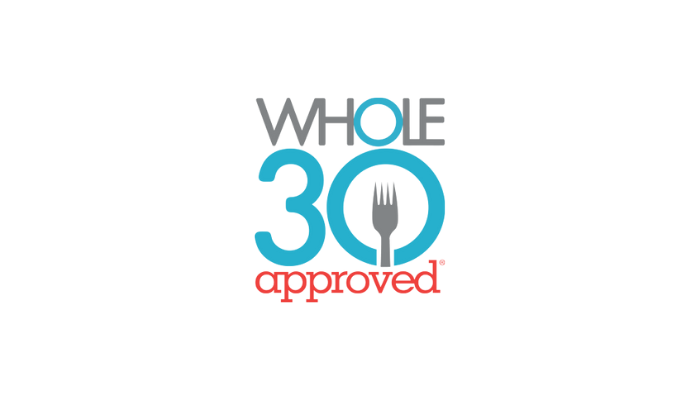
Check The Ingredients
The Whole30 website provides recommendations on reading food labels to decide if they are okay for the diet.
You can follow these guidelines and thoroughly read an almond milk brand’s label to discover whether it contains ingredients off-limits for Whole30.
For example, you may want to familiarize yourself with Whole30’s sneaky sugars and additives list when searching for acceptable almond milk.
Soy lecithin and carrageenan are forbidden, as are sugars listed as “dextrose” or “maltodextrin”.
These ingredients can be easy to miss in commercial almond milk if you aren’t paying close attention.
Whole30 Approved Almond Milk Brands
To help you pick Whole30-approved almond milk brands, we’ve compiled a list of options either explicitly approved by the Whole30 program or approved by virtue of their simple ingredients.
The following almond milk brands should are good choices for you when doing Whole30:
MALK
MALK unsweetened almond milk is listed on Whole30’s official approved list.
MALK almond milk uses three simple ingredients in its product: filtered water, sprouted almonds, and Himalayan salt.
MALK boasts that it contains no dairy, no binders, no fillers, no soy, no gluten, and no carrageenan.
These characteristics make MALK Whole30-friendly and allowable while doing the thirty-day program.
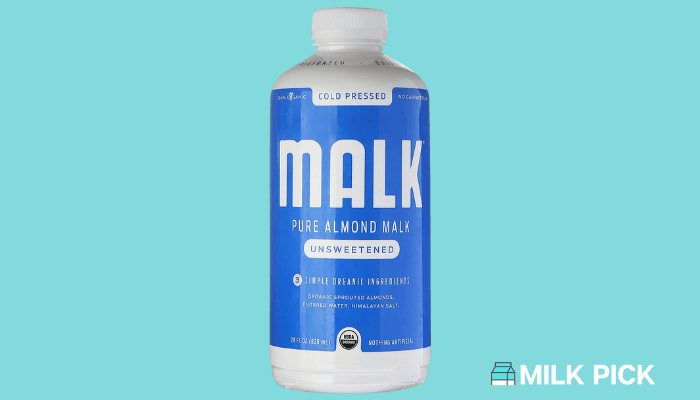
JOI
JOI almond milk nut base is also an officially approved Whole30 item.
This product contains blanched almonds ready to blend with water to create tasty, homemade almond milk.
It comes in a 15-ounce jar for easy storage (for up to 18 months) and lets you make up to seven quarts of the beverage.
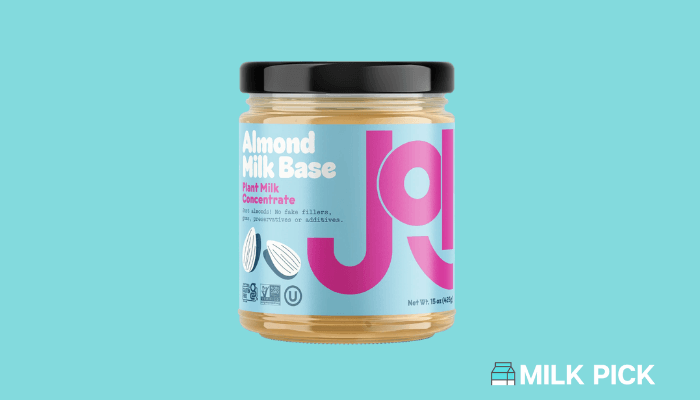
New Barn Organics
Another Whole30-approved almond milk is New Barn Organics.
This option contains filtered water, organic almonds, and sea salt, which is perfect for the Whole30 diet.
The almonds in New Barn Organics come from a co-opted Spanish farm that uses sustainable dry-farming to grow their almonds.
This product is certified organic, dairy-free, kosher, and Non-GMO Project verified.
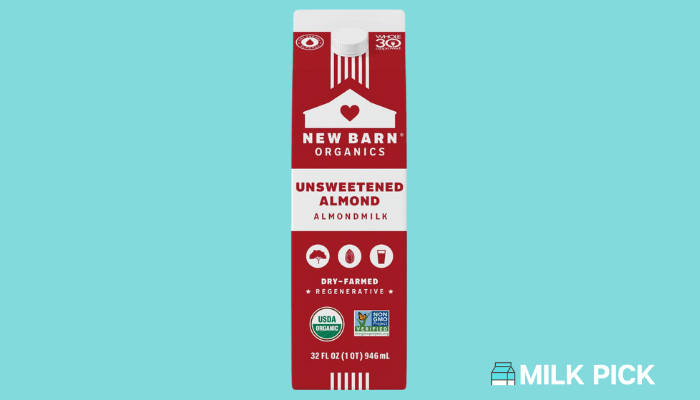
Elmhurst Almond Milk
Although not listed on Whole30’s official list, Elmhurst almond milk is Whole30-friendly.
This product is shelf-stable due to a unique HydroRelease Method.
It only contains almonds and water, so there are no gums, emulsifiers, or carrageenan in the beverage.
Elmhurst uses about four times more almonds than other brands, so you get extra nutrients with this choice.
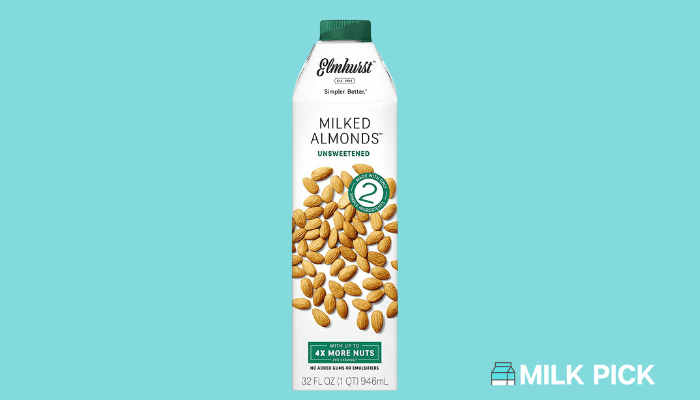
Three Trees Almond Milk
Three Trees almond milk is an organic plant-based beverage that contains just almonds and water.
The brand doesn’t use oils, salt, or thickening gums to make its product.
Instead, they make their almond milk with 100% sustainably grown almonds at around four times the concentration of most other commercial brands.
Three Trees is also not yet listed on the Whole30 website, but with just two Whole30-approved ingredients, it should be acceptable for the program.
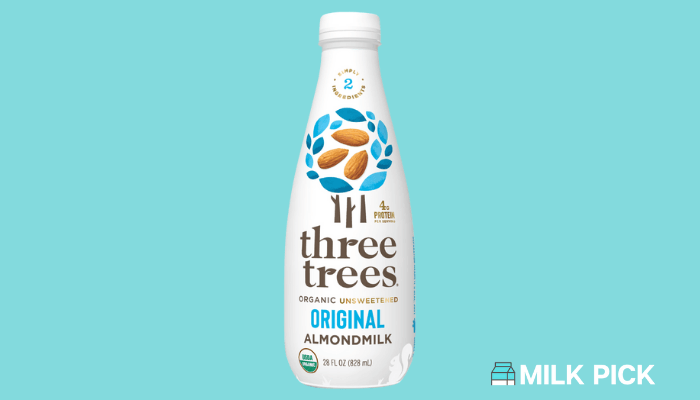
Where Can You Find Whole30-Approved Almond Milk Products?
When on the Whole30 program, you may have to special order commercially made almond milk from Whole30-friendly companies.
For example, Three Trees almond milk is only available through the company’s website.
You can find some Whole30-friendly almond milk brands in your local health food stores.
Elmhurst offers a store-locator tool so you can find a store near you.
New Barn Organics is available in the Western U.S. and online.
You can find JOI almond milk base on Amazon and the company website, and MALK is also available on Amazon and offers a store-finder for local carriers.
Commit to Whole30 With The Right Almond Milk
Whole30 requires you to follow strict dietary requirements while on the program.
It’s important not to sabotage your progress on the plan by accidentally buying the wrong almond milk.
You can ensure that your almond milk is Whole30-approved by reading the label carefully and only buying brands that use simple ingredients like salt, water, and almonds or making your own at home.
